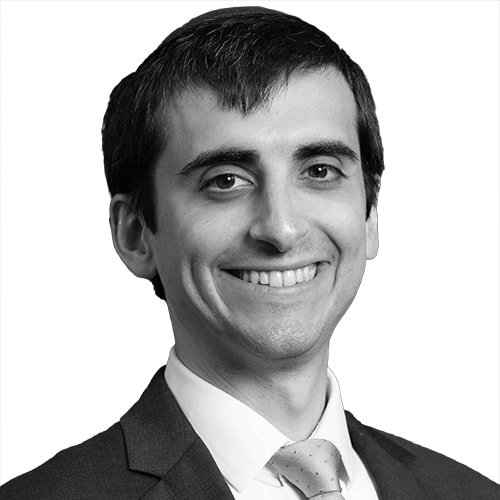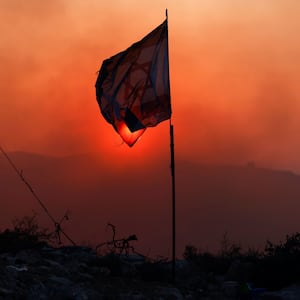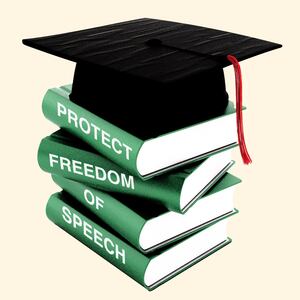After a week of unimaginable pain in the Jewish community, I never expected I’d be driving to a large Palestinian community in the Chicago suburbs.
Yet on Monday afternoon, my colleague Rabbi Ari Hart and I found ourselves on an hour-long drive from Skokie, a deeply Jewish enclave north of Chicago, to a mosque in Bridgeview, Illinois, also known as “Little Palestine.”
We came to offer comfort to the father of Wadea al-Fayoume, a Muslim, Palestinian-American boy murdered on Sunday. Police say he was targeted by his family’s landlord because of his faith and identity, in response to the conflict in Israel. His mother, Hanaan Shahin, was also repeatedly stabbed and is hospitalized.
Rabbi Hart and I direct Solu, a bridge-building initiative that connects Orthodox Jews with diverse communities across the Chicago region. We wanted to find a way to show our support for this aching family. So we joined a handful of rabbis at Wadea’s funeral, all of us aghast at the loss of this little boy.
Our hearts were already raw. Our community has been reeling: On Oct. 7, as we prayed in our synagogue on a Jewish holiday, we learned that Hamas terrorists had launched a 9/11-style terrorist attack against Israeli civilians—killing whole families, kidnapping children, livestreaming murders. Tears and shock cascaded across the modern Orthodox congregation where we serve as rabbis.
For our community, this attack is personal. Our siblings, parents, or close friends live in Israel. We know some of the 1,300 Israelis killed thus far. Family members of a young man kidnapped from an Israeli music festival are members of our synagogue; they don’t know if he is alive or dead.
The attack was also personal because we’re Jews. Hamas, whose founding charter is rife with anti-Jewish hate, sought to kill as many Jews as they could—men, women, children, and babies.
We believe Israel is now engaged in a just war to destroy Hamas, an autocratic terrorist organization that has ruled Gaza with an iron fist. And we have room in our hearts for the terrible pain this war is causing innocent Gazans, even as we believe in its necessity.
In the midst of our pain, we read of the al-Fayoume family’s pain. We understood that the local Muslim and Palestinian communities were reeling. And we made room in our hearts for their pain, too.
The same values that compel us to condemn Hamas barbarism lead us to condemn this terrible act of hate: the supreme values of life and tolerance—the Biblical call to build a society where “every one can sit beneath their vine and fig tree, and there is no one to make them afraid” (Micah 4:4).
So we traveled to the mosque. We met with the imam. We heard Wadea’s father’s lament. We shed tears for him and his wife. We expressed our horror at their terrible loss.
And we heard the community’s understandable fears of more hate crimes against American Muslims in the wake of this attack, which we pray will not occur.
I was quite nervous about how the community would feel about our presence—it’s not often that two Orthodox Jewish, Zionist rabbis walk into a Palestinian-American mosque. But the leaders of the mosque and the Muslim community welcomed us warmly.
Our divergent backgrounds or views on the conflict didn’t matter in this moment. We mentioned the fundamental belief that is central to both Islam and Judaism: that whoever murders a human, destroys an entire world (Mishnah Sanhedrin 4:5, Quran 5:32). In the words of Rabbi Hart, “The murder of a 6-year-old because of his faith and his identity is not complicated. It is a heinous crime.”
Members of their congregation walked up to thank us for our presence. One prayer-goer quietly asked how our community was faring during this dark time; an Egyptian man expressed his outrage over recent violence against Jews in Egypt. I felt the flickers of brotherhood with these strangers—who made room in their hearts for my pain. That’s no easy feat.
Here in Chicago, we’re trying to bridge the gulf between the Orthodox community and other communities.
Through our work in Solu, the bridge-building initiative, we’ve traveled to the South Side of Chicago, an area riven by gun violence, to offer our support to the black Christian community—building a literacy center for kids, distributing food, and releasing medical debt. We’ve built bridges to the Rohingya Muslim community, a group of refugees bearing the scars of religious persecution. We’ve resettled a Guatemalan refugee family, and fed the homeless down the street.
We bear a simple message for our neighbors: You are not alone. And that includes our Palestinian-American neighbors.
Before she was attacked by her landlord, Wadea’s mother is reported to have said, “Let’s pray for peace.”
We join her in praying for peace—“peace to those far and near,” (Isaiah 57:19), a lasting peace that lets every child reach adulthood, wherever they live, however they worship.







